Transfer News
October – December 2024
UFZ Technology Transfer Award: Innovative Measurement Method for Monitoring Methane Deposits in Lakes and Deep Water
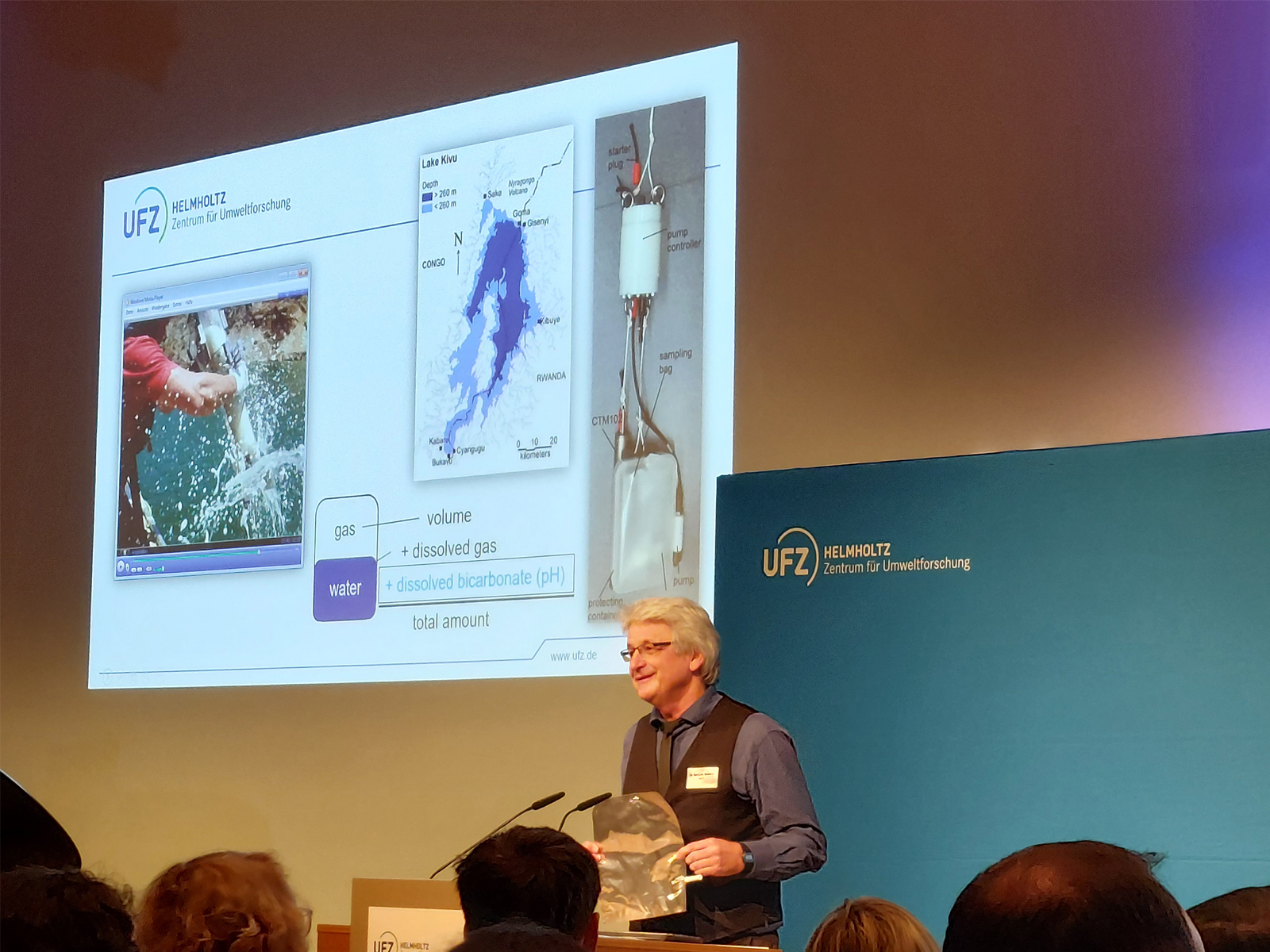 Dr. PD Bertram Boehrer from the Department of Lake Research (SEEFO) was awarded the UFZ Technology Transfer Prize 2024 on December 10 for his development.
Dr. PD Bertram Boehrer from the Department of Lake Research (SEEFO) was awarded the UFZ Technology Transfer Prize 2024 on December 10 for his development.
The measurement method enables reliable determination and monitoring of gas content in lakes and deep water while simultaneously assessing risks of limnic eruptions. The cost-effective and easily calibrated method is characterized by its simple implementation in Africa, with accompanying software enabling its use even by non-experts. This may help to prevent future unintentional limnic eruptions (such as the one that occurred at Lake Nyos in Cameroon in 1986, killing 1,700 people in the sparsely populated area).
Bertram Boehrer's dedicated engagement in Rwanda, leading to a successful international technology transfer, is particularly commended. The developed solution is being implemented by local authorities and makes a significant contribution to the country's electrification.
The UFZ Technology Transfer Award recognizes outstanding transfer achievements that integrate scientific findings into societal decision-making processes and contribute to addressing major environmental and societal challenges.
December 2024
Fraunhofer IMW and UFZ: Joining forces against everyday pollutants
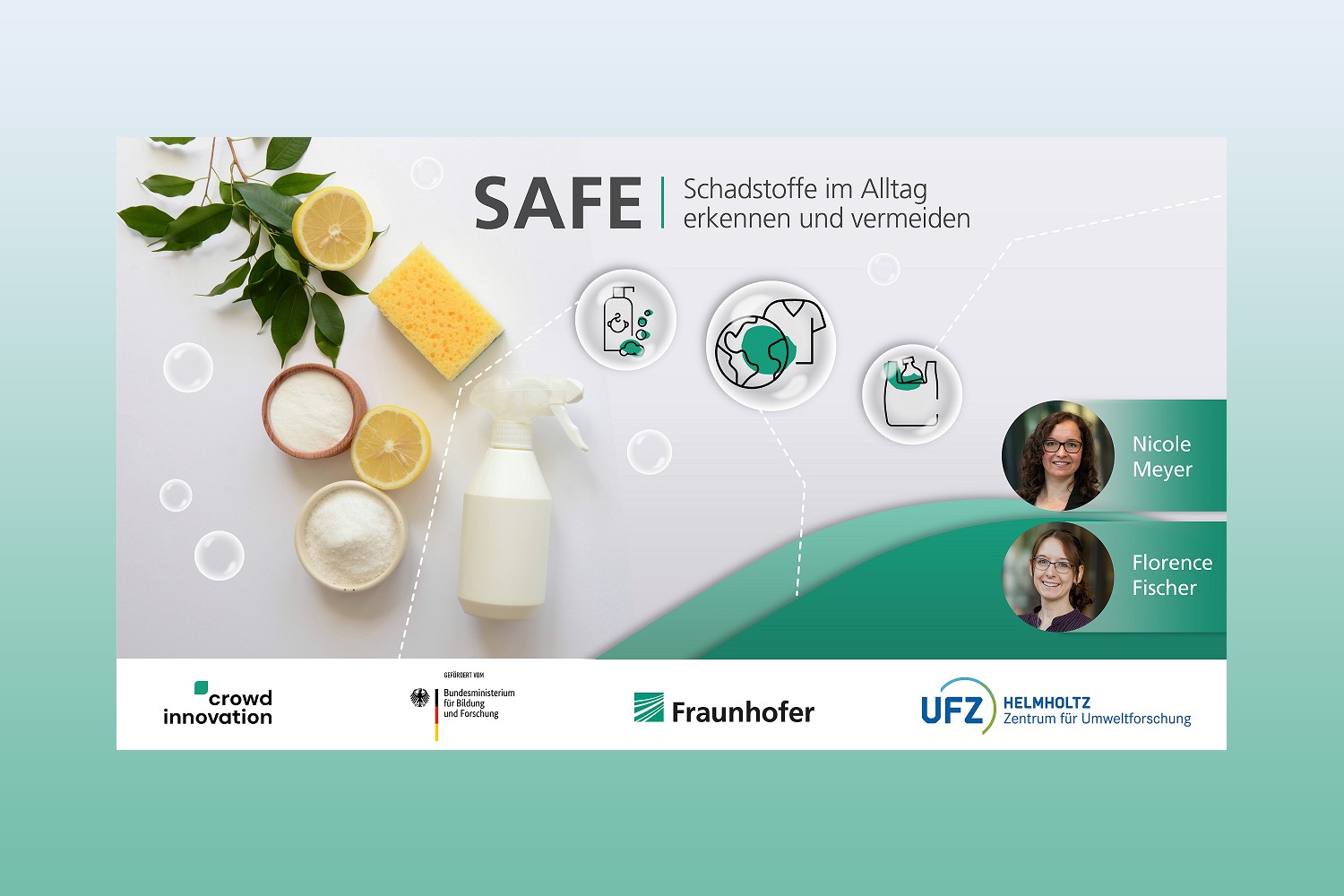 Evaluation process in full swing
Evaluation process in full swing
The SAFE Challenge, initiated by Fraunhofer IMW and UFZ, seeks innovative solutions to raise public awareness about pollutants in everyday products. The submitted proposals are now undergoing a two-stage evaluation process:
1. Crowd Evaluation: The public has the opportunity to rate the ideas and choose their favorites.
2. Jury Evaluation: A jury made up of members of the SAFE Challenge Team will review and assess the proposals.
The jury evaluates all submissions for feasibility and originality and also takes the crowd rating into account. That means that 40 % of the points are based on the crowd voting and 60 % on the jury's assessment.
The SAFE Challenge aims to:
• Raise awareness of dangerous environmental chemicals in everyday products
• Identify and reach new target groups
• Find effective communication channels for conveying important information
The best submissions will be rewarded with prizes of up to €500.
Outlook
The impressive response of 119 submitted ideas underscores the relevance of the topic to the public. The best idea should then be implemented. The SAFE Challenge not only promises valuable insights into avoiding pollutants in everyday life but also provides specific suggestions for implementation, and can thus contribute to improving environmental and health protection.
December 2024
United for the Environment - Citizen Science Connects Research, Engagement, and Collective Action
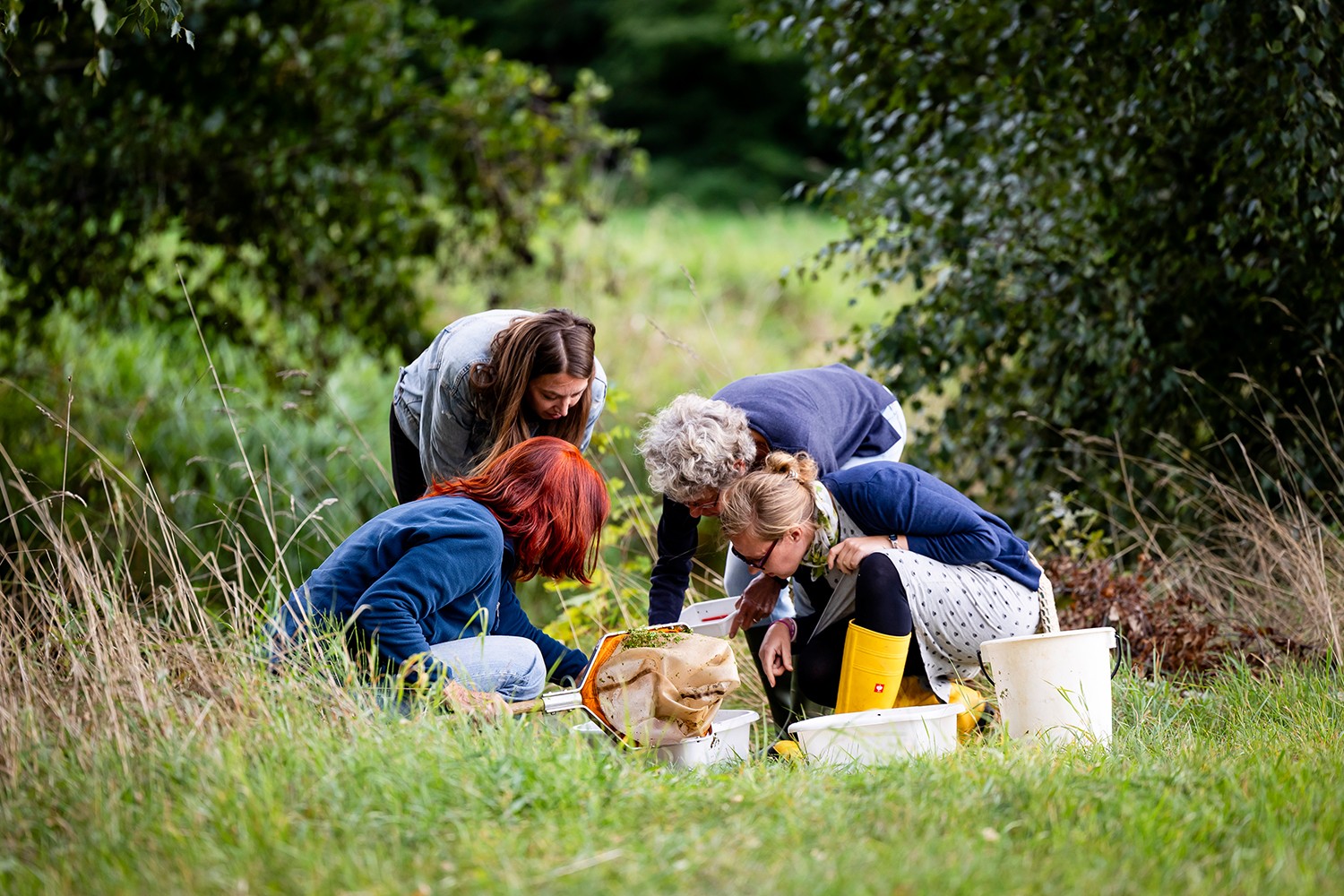 Citizen science, the involvement of citizens in research projects, is gaining importance in environmental research. A recent publication by Julia von Gönner and colleagues examines the effects of citizen science projects for monitoring flowing waters on participants.
Citizen science, the involvement of citizens in research projects, is gaining importance in environmental research. A recent publication by Julia von Gönner and colleagues examines the effects of citizen science projects for monitoring flowing waters on participants.
The survey of 213 volunteers shows that participants develop a better understanding of water bodies and their threats, improve their monitoring skills, and participate more frequently in environmental protection activities. Additionally, a stronger identification with the project group emerges.
These effects demonstrate that citizen science not only provides scientific data but also positively influences participants' knowledge and behaviour, regardless of prior experience, raising awareness for ecosystem protection and promoting long-term engagement.
Given the poor condition of many European water bodies, the publication emphasises the need for strategic support for citizen science projects like FLOW - for example, through political measures to encourage citizen participation in freshwater monitoring.
Overall, the results of the survey show that citizen science creates a strong connection between science and society, thus making an important contribution to addressing environmental problems. By supporting such projects, UFZ provides important impulses to further strengthen this connection.
December 2024
Publication: https://besjournals.onlinelibrary.wiley.com/doi/10.1002/pan3.10714
Leipzig Company Uses UFZ Method HILCSA for Sustainability Assessments and Consulting
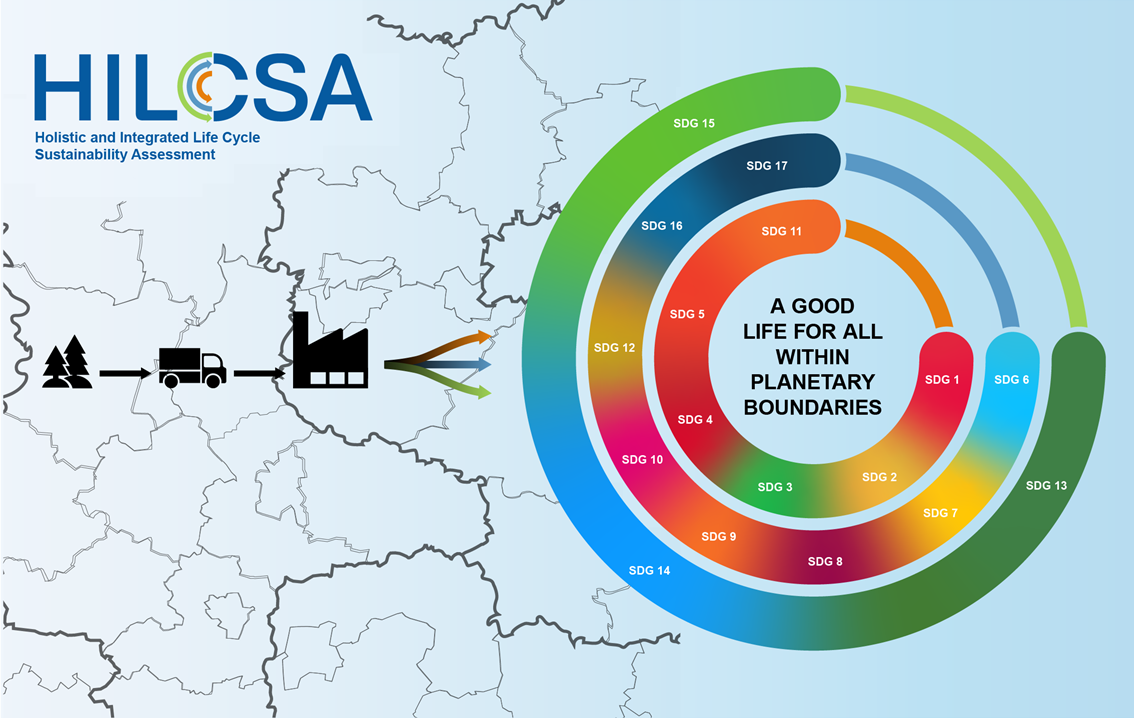 Leipzig-based startup TRASH GALORE has become the first company to acquire the license for UFZ's HILSCA (Holistic and Integrated Life Cycle Sustainability Assessment) method [https://www.ufz.de/index.php?en=50083]. Developed by Dr.-Ing. Walther Zeug, HILSCA is based on the theory of societal relations to nature and enables a holistic analysis in accordance with ISO 14040 and 14044.
Leipzig-based startup TRASH GALORE has become the first company to acquire the license for UFZ's HILSCA (Holistic and Integrated Life Cycle Sustainability Assessment) method [https://www.ufz.de/index.php?en=50083]. Developed by Dr.-Ing. Walther Zeug, HILSCA is based on the theory of societal relations to nature and enables a holistic analysis in accordance with ISO 14040 and 14044.
The method integrates about 100 qualitative and quantitative indicators, addressing 14 of the 17 UN Sustainable Development Goals. It allows for a comprehensive assessment of ecological, economic, and social sustainability and is being applied in this case to the event industry. HILSCA enables the identification and analysis of synergies, conflicts of objectives, and hotspots in production and consumption systems.
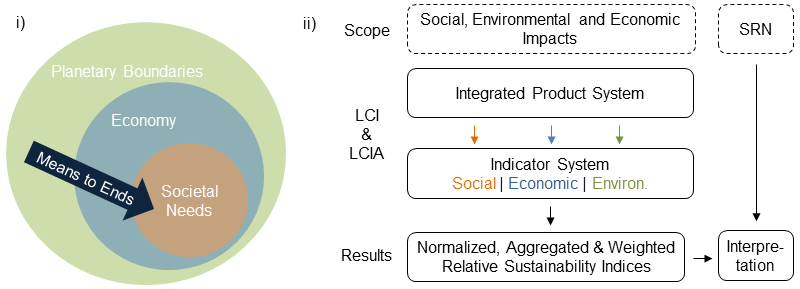 Figure 1: i) Sustainability model, ii) Framework of HILCSA = f (S-LCA, E-LCA, LCC) (integrated product and production systems in openLCA entail ecological, social and economic data) Dr.-Ing. Walther Zeug
Figure 1: i) Sustainability model, ii) Framework of HILCSA = f (S-LCA, E-LCA, LCC) (integrated product and production systems in openLCA entail ecological, social and economic data) Dr.-Ing. Walther Zeug
With the licensing available since March 2024, TRASH GALORE can now conduct effective and systematic sustainability assessments for their clients' events.
HILSCA provides a well-founded decision-making basis for stakeholders from politics, society, research, and business to optimize sustainable production systems and marks an important step towards more sustainable events in the event industry.
Are you also interested in a licence? If so, please contact
wtt@ufz.de
.
December 2024
Tapping the entrepreneurial potential at UFZ
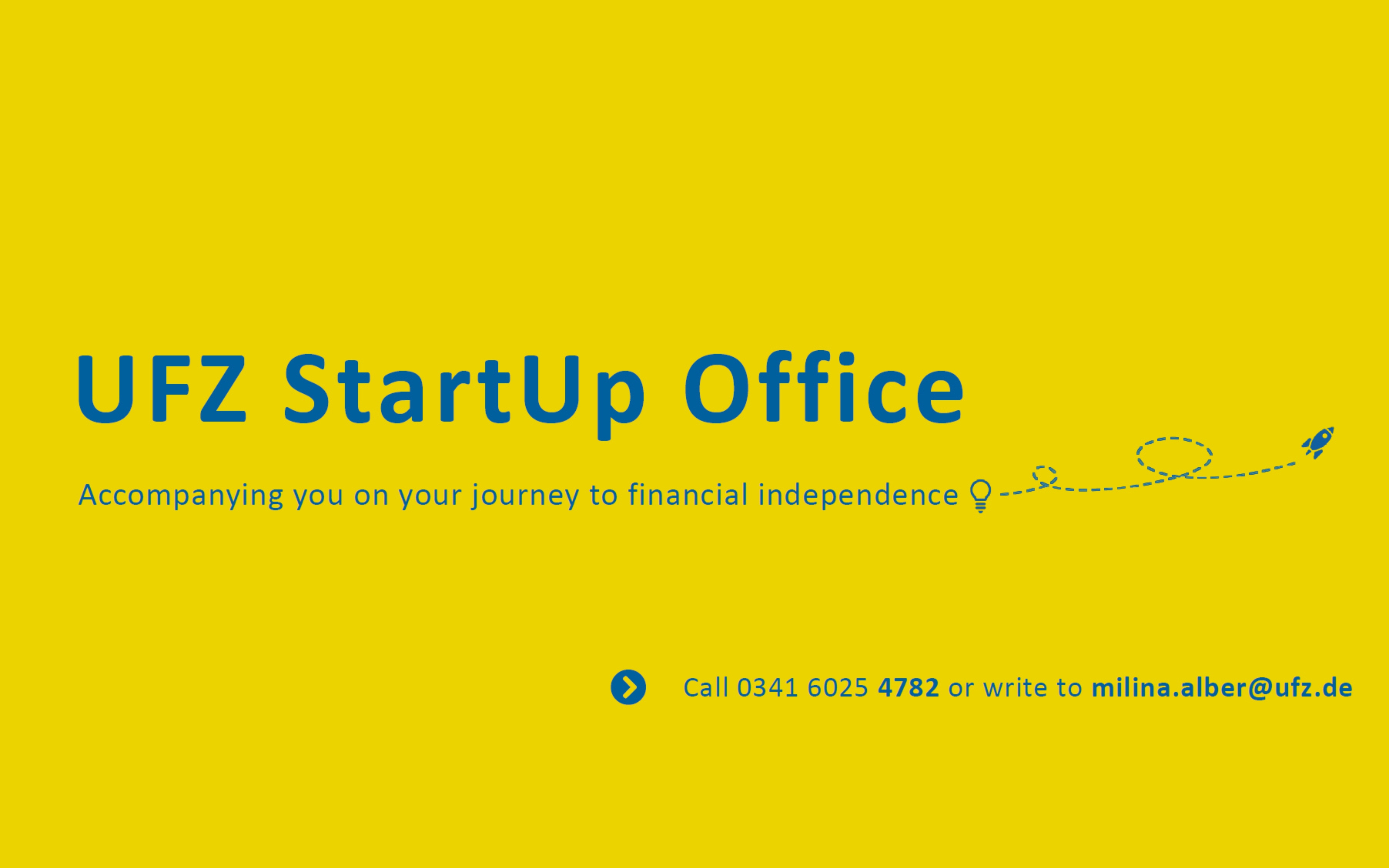 In 2021, a strategic collaboration between the UFZ and the HoMe start-up service at the Merseburg University of Applied Sciences was launched with the aim of developing the support offer for start-ups further, tracking innovative potential and promoting entrepreneurship at both institutions. After 4 years, we draw a positive balance.
In 2021, a strategic collaboration between the UFZ and the HoMe start-up service at the Merseburg University of Applied Sciences was launched with the aim of developing the support offer for start-ups further, tracking innovative potential and promoting entrepreneurship at both institutions. After 4 years, we draw a positive balance.
Since 2021, the “Potentiale heben” funding module of the “EXIST-Potentiale” programme, financed by the Federal Ministry for Economic Affairs and Climate Protection (BMWiK), has also been executed at the UFZ as part of a cooperation with the Merseburg University of Applied Sciences, with an aim to transfer sustainable, innovative ideas from both institutions into economic value creation and to benefit from the mutual exchange of experience. The focus is on special coaching and support services, which are coordinated and implemented by the UFZ StartUp Office. These services include courses and workshops on topics such as design thinking, business modelling, value proposition, market research, intellectual property rights or start-up-related topics (marketing, law, taxes, ...). The high demand for these services is reflected in the following numbers: since 2021, 869 participants have taken part in 58 events. In addition, 21 spin-off teams have been closely supported in coaching and regular jour fixe meetings. Five of these teams have already successfully founded a company.
One outstanding example is the UFZ spin-off RWInnoTEC GmbH. The interdisciplinary team, consisting of the physicists Dr. Markus Kraus (managing director) and Dr. habil. Ulf Roland, the chemist Dr. Ulf Trommler, engineers Dr.-Ing. Frank Holzer and Dipl.-Ing. Christian Hoyer, and business economist Maria Kraus, aims to establish a wide range of applications for radio wave technology on the market, particularly in road renovation. The RWInnoTEC team was funded by the EXIST research transfer program in phases I and II with over one million Euro. They were nominated for the 2022 Saxon Founder Award and won the 2022 Leipzig Innovation Award.
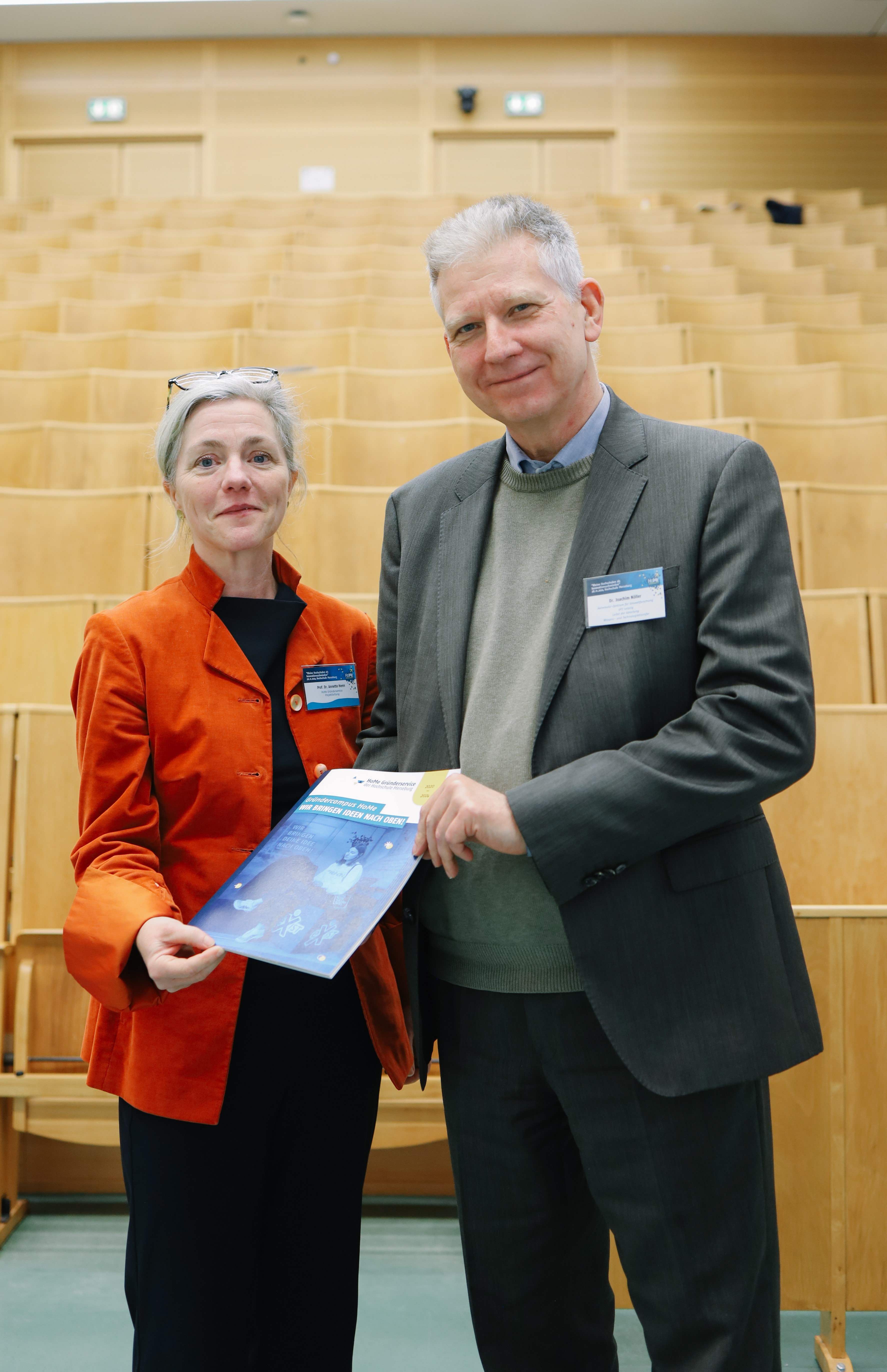 Prof. Dr Annette Henn (Merseburg University of Applied Sciences) and Dr Joachim Nöller with the project brochure at the closing event “Small universities as forges of innovation and important keys to social transformation”
Prof. Dr Annette Henn (Merseburg University of Applied Sciences) and Dr Joachim Nöller with the project brochure at the closing event “Small universities as forges of innovation and important keys to social transformation”
An important aspect of the collaboration between HoMe and UFZ is the intensive exchange of know-how and best practices. In particular, HoMe has benefited from UFZ's expertise in the areas of intellectual property rights, exploitation processes and transfer strategies. Since the beginning of the collaboration, UFZ employees have conducted 48 consultations on intellectual property rights (patents, trademarks, know-how, data exploitation, software licenses, etc.). In addition, a HoMe employee shadowed in the UFZ's transfer department, enabling her to gain valuable insights into the practical processes of technology transfer.
The funding ends on 31 December 2024, but the support provided by the UFZ StartUp Office will continue. The entrepreneurship programme, which was developed, tested and introduced at the UFZ, aims to motivate UFZ researchers, reduce their fears, encourage entrepreneurial thinking and action, and establish a start-up culture at the centre.
Do not hesitate to contact us if you have an idea!
Contact:
Milina Rochelle Alber
UFZ StartUp Office
Tel: 0341 6025 4782
November 2024
